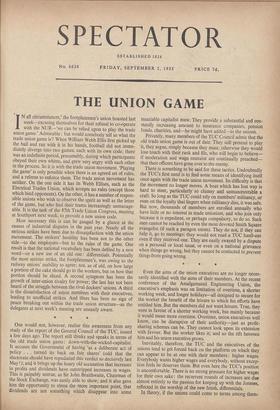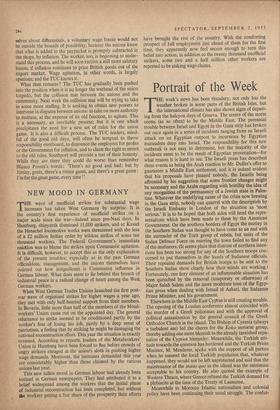THE UNION GAME
/ ' N all circumstances,' the footplatemen's union boasted last week—excusing themselves for their refusal to co-operate with the NUR—'we can be relied upon to play the trade union game.' Admirable: but would somebody tell us what the trade union game is? When William Webb Ellis first picked up the ball and ran with it in his hands, football did not imme- diately diverge into two games, each with its own code; there was an indefinite period, presumably, during which participants obeyed their own whims, and grew very angry with each other in the process. So it is with the trade union movement. 'Playing the game' is only possible when there is an agreed set of rules, and a referee to enforce them. The trade union movement has neither. On the one side it has its Webb Ellises, such as the Electrical Trades Union, which accepts no rules (except those which bind opponents). On the other, it has a number of respon- sible unions who wish to observe the spirit as well as the letter of the game, but who find their teams increasingly unmanage- able. It is the task of the 87th Trade Union Congress, meeting at Southport next week, to provide a new union code.
How necessary this is can be gauged by a glance at the causes of industrial disputes in the past year. Nearly all the serious strikes have been due to dissatisfaction with the union movement. The strikers' hostility has been not to the other side—to the employers—but to the rules of the game. One result is that the national vocabulary has been defiled by a new word—or a new use of an old one : differentials. Potentially the most serious strike, the footplatemen's, was owing to the railway unions' inability to agree; not, as of old, on how large a portion of the cake should go to the workers, but on how that portion should be sliced. A second symptom has been the growth of inter-union rivalry for power; the last has not been heard of the struggle between the rival dockers' unions. A third is the dissatisfaction of union members with their executives, leading to unofficial strikes. And there has been no sign of peace breaking out within the trade union structure—as the delegates at next week's meeting are uneasily aware.
One would not, however, realise this awareness from any study of the report of the General Council of the TUC, issued a few days ago. The report still thinks and speaks in terms of the old trade union game : down-with-the-wicked-capitalist. It accuses the Government of having 'as a deliberate act of policy . . . turned its back on fair shares' (odd that the electorate should have repudiated this verdict so decisively last May !); ancl it brings up the hoary old accusation that increases in profits and dividends have outstripped increases in wages. This is palpably untrue, as Sir John Braithwaite, Chairman of the Stock Exchange, was easily able to show; and it also gave him the opportunity to stress the more important point, that dividends are not something which disappear into some insatiable capitalist maw. They provide a substantial and con- stantly increasing amount to insurance companies, pension funds, charities, and—he might have added—to the unions.
Privately, many members of the TUC Council admit that the old trade union game is out of date. They still pretend to play it, they argue, simply because they must; otherwise they would lose touch with their rank and file, who will begin to believe— if moderation and wage restraint are continually preached— that their officers have gone over to the enemy.
There is something to be said for these tactics. Undoubtedly the TUC's first need is to find some means of identifying itself once again with the trade union movement. Its difficulty is that the movement no longer moves. A boat which has lost way is hard to steer, particularly so clumsy and unmanceuvrable a craft. So long as the TUC could rely on members' militancy, or even on the loyalty that lingers when militancy dies, it was safe. But now, thousands of members are enrolled annually who have little or no interest in trade unionism, and who join only because it is expedient, or perhaps compulsory, to do so. Such men cannot be reached by even the most devoted Smith Square evangelist (if such a paragon exists). They do not, if they can help it, go to meetings; they would not read a TUC hanti-out even if they received one. They are easily swayed by a dispute on a personal or local issue, or even on a national grievance when things go wrong, but they cannot be contacted to prevent things from going wrong.
Even the aims of the union executives are no longer neces- sarily identified with the aims of their members. At the recent conference of the Amalgamated Engineering Union, the executive's emphasis was on limitation of overtime, a shorter working week, and longer holidays—all designed to secure for the worker the benefit of the leisure to which his efforts have entitled him. But the members did not want leisure. True, they were in favour of a shorter working week, but mainly because it would mean more overtime. Overtime, union executives well know, can be disruptive of their authority—just as profit- sharing schemes can be. They cannot look upon its extension with favour. But the worker likes it; and so the rift between him and his union executive grows.
Inevitably, therefore, the TUC and the executives of the unions tend to get forced back on the platform on which they can appear to be at one with their members : higher wages. Everybody wants higher wages and everybody, without excep- tion feels he deserves them. But even here the TUC's position is uncomfortable. There is no strong pressure for higher wages for their own sake: the recurrent rounds of increases are due almost entirely to the passion for keeping up with the Joneses, reflected in the worship of the new fetish, differentials.
In theory, if the unions could come to terms among them- selves about differentials, a voluntary wage freeze would not be outside the bounds of possibility, because the unions know that what is added to the paypacket is promptly subtracted in the shops, by inflation. The worker, too, is beginning to under- stand this process, and he will soon receive a still more salutary lesson, if inflation continues to price British goods out of the export market. Wage agitation, in other words, is largely spurious; and the TUC knows it.
What then remains? The TUC has gradually been pushed into the position when it is no longer the warhead of the union torpedo, but the collision mat between the unions and the community. Next week the collision mat will be trying to take in some more stuffing. It is seeking to obtain new powers to intervene in disputes between unions: to take on more authority to restrain, at the expense of its old function, to agitate. This is a necessary, an inevitable process; but it is one which precipitates the need for a new set of rules for the union game. It is also a difficult process. The TUC leaders, mind- ful of the good old days, will often be tempted to throw responsibility overboard, to denounce the employers for profits or the Government for inflation, and to claim the right to revert to the old rules. Southport will provide a test of their honesty. While they are there they could do worse than remember Blanco Posnet's words : 'There's no good and bad; but by Jiminy, gents, there's a rotten game, and there's a great game: I'm for the great game, every time !'



































 Previous page
Previous page